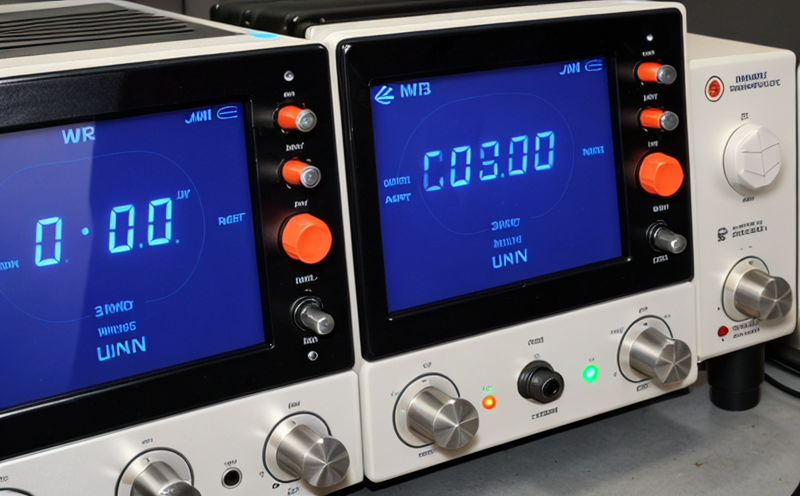FCC Part 22 Cellular Communication RF Testing for IoT Systems
In today’s rapidly evolving technological landscape, the Internet of Things (IoT) represents a significant advancement in connectivity. This innovation has led to an array of devices that can communicate wirelessly with each other and the broader network infrastructure. However, this interconnectedness comes with regulatory requirements aimed at ensuring safety, interoperability, and compliance.
The FCC Part 22 is a critical standard for cellular communication within IoT systems. It defines the technical parameters that must be met by devices operating in specific radio frequency bands used for public mobile service. This ensures that these devices do not cause harmful interference to other licensed or unlicensed users of the radio spectrum.
The FCC Part 22 Cellular Communication RF Testing is a rigorous process designed to verify that IoT systems meet the required technical specifications and regulatory mandates set by the FCC. It involves detailed testing procedures, including but not limited to frequency emissions, power levels, and interference characteristics. This ensures that all devices operating in these bands are safe for public use.
The testing requirements under Part 22 are designed to protect the integrity of wireless communication systems while allowing for efficient use of spectrum resources. Compliance with this part is essential for manufacturers, integrators, and developers looking to bring their IoT products into the market or deploy them in public mobile networks.
Our laboratory specializes in providing comprehensive testing services that help clients meet these stringent requirements. Our state-of-the-art facilities are equipped with advanced instrumentation capable of simulating real-world conditions to ensure accurate measurement and analysis. We employ a team of experienced engineers who understand both the technical intricacies and regulatory nuances involved in this process.
By choosing our service, you gain access to cutting-edge technology tailored specifically for the unique challenges posed by IoT devices operating under FCC Part 22 regulations. Our comprehensive approach ensures not only compliance with current standards but also prepares your product for future changes or expansions within the market.
In summary, FCC Part 22 Cellular Communication RF Testing is an indispensable step in ensuring that your IoT system meets all necessary regulatory requirements while delivering reliable performance across various environments. Investing in this testing early in the development cycle can save time and money later on by avoiding costly last-minute modifications or potential product failures.
Benefits
Compliance with FCC Part 22 Cellular Communication RF Testing offers numerous advantages for businesses operating within the IoT sector:
Safeguards against potential interference issues that could disrupt other wireless services or networks.
Avoids costly recalls and product modifications due to non-compliance once devices are already on the market.
Enhances brand reputation by demonstrating a commitment to high-quality, safe products.
Promotes smoother integration into existing network infrastructures without causing disruptions or service outages.
Facilitates faster time-to-market for new products as thorough testing early in the process reduces development timelines and associated costs.
Ensures long-term reliability of devices by identifying potential weaknesses or areas needing improvement before product release.
These benefits underscore why investing in FCC Part 22 Cellular Communication RF Testing is crucial for any company involved in designing, manufacturing, or deploying IoT solutions.
Industry Applications
Smart Home Devices: Ensuring compatibility and safe operation of smart thermostats, security cameras, and lighting systems.
Automotive Telematics: Verifying robust connectivity between vehicle components and external networks for enhanced safety features like collision avoidance systems.
Industrial IoT (IIoT): Confirming seamless communication among machinery and sensors in manufacturing plants to optimize productivity and reduce downtime.
Agriculture: Guaranteeing reliable data transmission from field sensors back to central hubs for precision farming practices such as irrigation control and crop monitoring.
Healthcare: Ensuring secure, uninterrupted communication between medical devices and remote patient management systems to improve healthcare delivery.
Smart Cities: Facilitating efficient coordination of various urban services like traffic management, public transportation, and environmental monitoring through reliable IoT networks.
The diverse applications highlighted above demonstrate the broad impact that FCC Part 22 Cellular Communication RF Testing has across multiple industries. By adhering to these standards, manufacturers can ensure their products function correctly within complex, interconnected environments.
International Acceptance and Recognition
The importance of FCC Part 22 Cellular Communication RF Testing extends beyond domestic markets; it also holds significant recognition internationally:
Many countries have adopted similar or compatible standards for cellular communication, making FCC compliance a global benchmark.
Achieving FCC certification can open doors to international markets where regulatory harmonization is increasingly sought after by governments and businesses alike.
The rigorous nature of these tests demonstrates a commitment to quality that resonates with consumers worldwide who are becoming more discerning about the products they purchase.
It enhances partnerships between domestic and foreign entities, fostering innovation and collaboration across borders.
In conclusion, compliance with FCC Part 22 Cellular Communication RF Testing not only meets local requirements but also positions your product favorably in a global market. This broad acceptance ensures that your IoT solutions are ready for deployment anywhere they might be needed.





